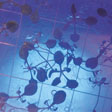 Building
a better vegetable Abel and co-principal investigator Carlos Quiros, a professor of vegetable crops, are focusing on sufora phane, a type of isothiocyanate that is found in high concentrations in cruciferous vegetables like broccoli, cabbage and kale. The importance of sufora phane as a potential, powerful cancer-preventive agent was first recognized by Dr. Paul Talalay, head of a team of researchers at Johns Hopkins University School of Medicine. Talalay also identified broccoli as a good source of sufora phane, and broccoli sprouts as an even better one. Sufora phane by itself doesn't do much, but it triggers the production of phase 2 detoxification enzymes in the body, little worker molecules that defuse carcinogens and toxins. This makes the toxins more soluble and able to be secreted by the kidneys. There are two enzyme systems induced by chemicals in the foods we eat which are important to carcinogen detoxification," says Abel. "Phase 1 enzymes are kind of a mixed bag. The really good guys you want are phase 2 enzymes."
Home |
Table of Contents |
To our Readers |
Building on Basics UC Davis Health System | © 2000, 2001, 2002 UC Regents. All rights reserved. |
  |
